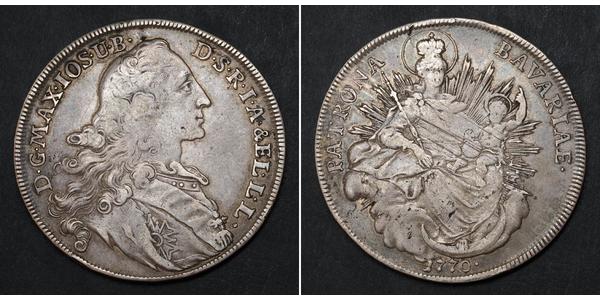(sold for $175.0)
1770, Bavaria (Electorate), Maximilian III Joseph. Silver Madonna Thaler Coin.
Mint Year: 1770 State: Bavaria (Electorate) Reference: Davenport 1953, KM-519.1. Denomination: Silver "Madonna" Thaler (Madonnentaler) Condition: Weight-adjusting marks in reverse, small scratches, light deposits, otherwise XF! Weight: 27.76gm Diameter: 41mm Material: Silver
Obverse: Draped bust of Maximilian III Joseph right, wearing Order of the Golden Fleece & large cross-shaped badge. Legend: D.G.MAX.IOS.&.P.S.D.C.P.R.S.R.I.A.&.EL.L.L.
Reverse: The Virgin (Madonna) seated in clouds, holding baby-Jesus child and cross-topped orb in left hand and scepter in right hand. Legend: PATRONA BAVARIAE . / 1770
The Electorate of Bavaria (German: Kurfürstentum Bayern) was an independent hereditary electorate of the Holy Roman Empire from 1623 to 1806, when it was succeeded by the Kingdom of Bavaria.
The Wittelsbach dynasty which ruled the Duchy of Bavaria was the younger branch of the family which also ruled the Electorate of the Palatinate. The head of the elder branch was one of the seven prince-electors of the Holy Roman Empire according to the Golden Bull of 1356, but Bavaria was excluded from the electoral dignity. In 1621, the Elector Palatine Frederick V was put under the imperial ban for his role in the Bohemian Revolt against Emperor Ferdinand II, and the electoral dignity and territory of the Upper Palatinate was conferred upon his loyal cousin, Duke Maximilian I of Bavaria. Although the Peace of Westphalia would create a new electoral title for Frederick V's son, with the exception of a brief period during the War of the Spanish Succession, Maximilian's descendants would continue to hold the original electoral dignity until the extinction of his line in 1777. At that point the two lines were joined in personal union until the end of the Holy Roman Empire. In 1805, after the Peace of Pressburg, the then-elector, Maximilian Joseph, raised himself to the dignity of King of Bavaria, and the Holy Roman Empire was abolished the year after.
Maximilian III Joseph (28 March 1727 – 30 December 1777) was Prince-elector of Bavaria from 1745 to 1777.
Born in Munich, Maximilian was the eldest son of Emperor Charles VII and his wife Marie Amalie, Archduchess of Austria. His maternal grandparents were Emperor Joseph I and Wilhelmina Amalia of Brunswick-Lüneburg.
Upon his father's death in 1745, he inherited a country in the process of being invaded by Austrian armies (see War of the Austrian Succession), and quickly abandoned his father's imperial pretenses and made peace with Maria Theresa in the Treaty of Füssen, in which he agreed to support her husband, Grand Duke Francis Stephen of Tuscany, in the upcoming imperial election.
MaximilianJoseph was a progressive and enlightened ruler who did much to improve the development of his country. In 1747 the porcelain factory at Nymphenburg was established. Munich's first academic institution, the Bavarian Academy of Sciences, was founded in 1759 by Maximilian III. During the severe dearth in 1770 Maximilian sold crown jewels to pay corn shipments. In this year he also issued his edict against the extravagant pomposity of the Church which contributed to the end of the era of Bavarian rococo. He also forbade the Oberammergau Passion Play. In 1771 the elector regulated the general school attendance.
In December of 1777 Maximilian Joseph died of small pox without leaving an heir. As the last of the junior branch of the Wittelsbach dynasty which derived from Louis IV, Holy Roman Emperor and had ruled Bavaria since early 14th century, his death led to a succession dispute and the brief War of the Bavarian Succession. Maximilian's consort Maria Anna Sophia of Saxony negotiated with Prussia to secure Bavaria's independence against Austria. Ultimately, he was succeeded by his distant cousin, the Elector Palatine Karl IV from the senior branch of the dynasty.
Max III Joseph is buried in the crypt of the Theatinerkirche in Munich.
Max III Joseph ordered in 1751 François de Cuvilliés to construct the splendid rococo Cuvilliés Theatre. Wolfgang Amadeus Mozart was received by Maximilian III Joseph, who was skilled in music and composed, but due to strict frugality no post was offered.
Only 1$ shipping for each additional item purchased!

|
Posted by:
anonymous 2021-01-06 |
1 Cent North Borneo (1882-1963) Bronze/Copper
group has 43 coins / 40 prices
⇑
1 Thaler Duchy of Mecklenburg-Schwerin (1352-1918) Silver Fr ...
group has 19 coins / 19 prices
⇑









-300-150-OnUKbzbiinAAAAFLxSGjltii.jpg)

-300-150-7BWP8ggt34cAAAFmIusvVi44.jpg)






